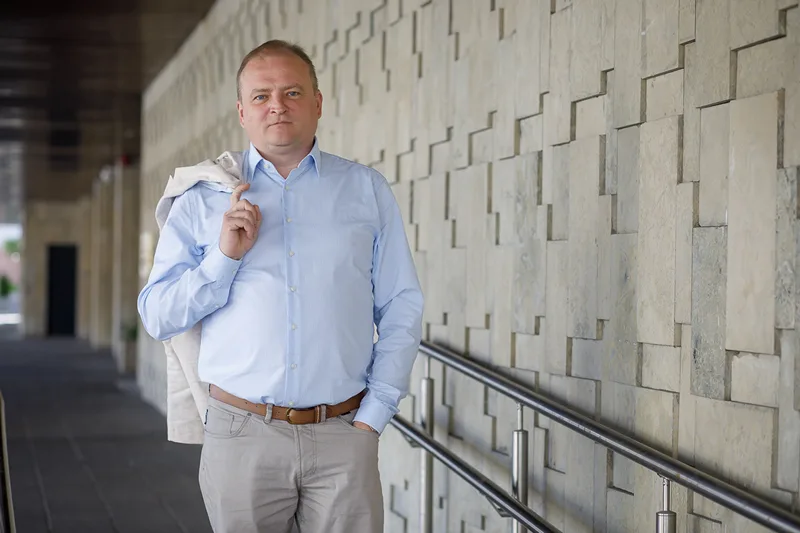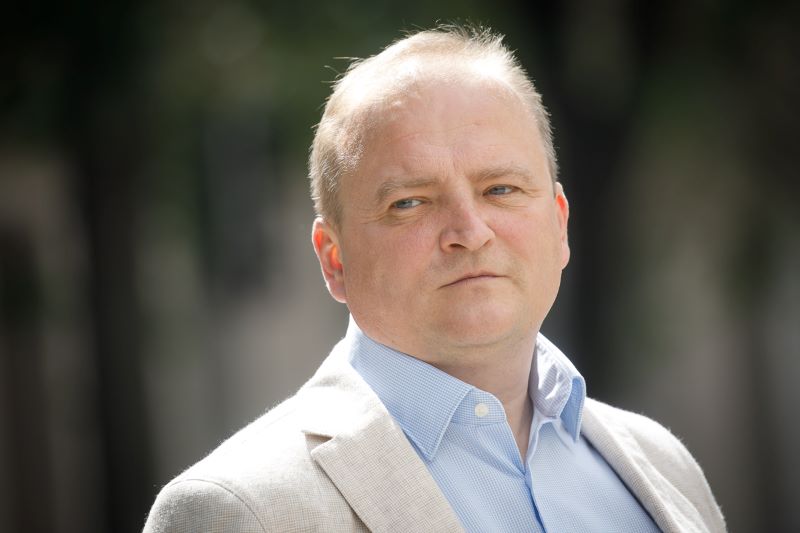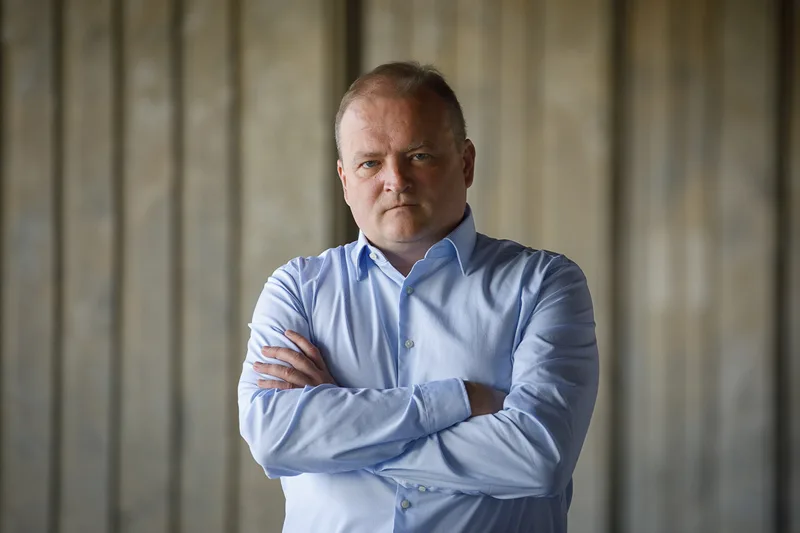Journalism in extreme conditions: How the BAJ Legal Center works
What help can the BAJ Legal Center provide? How can conflicts in the Belarusian media sphere be resolved? Why does Belarusian journalism need new ethical standards under extreme conditions? We discussed the answers to these questions with Aleh Aheyeu, head of the BAJ Legal Center.

Deputy Chairman of the Belarusian Association of Journalists Aleh Aheyeu. Photo: BAJ
“Minimize the impact of repression”
Who can turn to BAJ lawyers?
We don’t differentiate between Belarusian journalists who left and those who stayed. We see the journalistic community as one entity. Media lawyers are there to help everyone, whether they left or stayed.
What problems do journalists approach you with?
There are some peculiarities. The number of requests for legal assistance from journalists staying in Belarus has significantly decreased. There is a paradoxical situation: the wave of repression is growing, while there are fewer requests for legal assistance from Belarus. There are several reasons for this.
It has become clear to everyone that it is impossible to protect oneself with legal mechanisms in the country because they are not respected. The bodies that should protect rights – courts, prosecutor’s office, police – have turned into repressive structures. As a result, they have earned the badge “punitive.”
It is virtually impossible to mount a legal defense in Belarus. While we do assist in certain cases — preparing complaints and offering advice, for instance — our primary objective is not to shield individuals from repression but to mitigate its consequences.
Journalists who have left Belarus primarily request assistance in obtaining legal status (including for their families and relatives) in their new country of residence. Consequently, they focus more on the legislative tools of their host countries.
“Belarus does not offer training in media law”
How did you gather your team?
The professionals at the BAJ Legal Center are highly specialized and possess unparalleled expertise. In Belarus, educational institutions do not offer training in media law. The lawyers that BAJ has been training for decades are exceptional legal professionals who deeply understand the country’s legal landscape and are well-versed in international standards.
It is impractical for lawyers to be aware of the legislation of all countries where Belarusian media outlets are based. Although there are international legal standards, each country has its own specific characteristics. In such cases, we collaborate with colleagues from the countries where our journalists work to provide legal support in accordance with local legislation.
So you receive support from partner organizations?
Rather from individual lawyers. We work with different lawyers for different cases. Some cases need a lawyer specializing in a particular area, like media, tax, or banking law. We also work with organizations that help Belarusians obtain legal status.
What new trends have we seen in legal teams’ work in 2024?
The Legal Center’s three main focuses are protecting journalists’ rights, providing legal education to the media, and improving the situation of freedom of speech in Belarus.
From 2022 to 2024, we stopped making recommendations to the Belarusian authorities because they weren’t ready to listen to us. Also, we were declared an extremist formation and banned.

Aleh Aheyeu. Photo: BAJ
Needless to say, we don’t have the chance or appetite to engage with such authorities. This is not just BAJ’s view but that of the wider civil sector, too. There are only two ways to interact with the authorities: by making enquiries or by complaining—everything else has been put on hold.
However, there are proposals on the table for regulating the media after the political changes in Belarus. We’re developing legal rules aligning with international standards in the new Belarus. We’re figuring out how to approach the media, how to regulate it in a respectful and civilized way, and how to do it in the conditions of an unrepressive state apparatus.
Legal Center has acted as a mediator three times this year
Can you give some examples of your work?
One of the public cases involved a Belarusian journalist who was banned from entering the European Union. Poland placed him on a list of banned persons. Over the year, this case made some progress in the Polish court system.
It is also worth noting that some cases have their roots in the past, when Belarus had not yet denounced the Optional Protocol to the International Covenant on Civil and Political Rights (Aliaksandr Lukashenka signed the law on October 27, 2022). This document’s denunciation has deprived Belarus citizens of the opportunity to submit a complaint to the UN Human Rights Committee. Our lawyers are working on cases initiated before the denunciation of the Optional Protocol to reach a favorable conclusion for journalists.
Belarusians are often called “masters of quarrels,” which refers to their inclination to engage in disputes and conflicts on non-issues. Have your legal counsel had to intervene in the internal processes of Belarusian media organizations?
During the year, BAJ assumed the role of mediator on three occasions. Conflicts between various actors in the media sector have occurred previously. This year, we conducted three mediations between journalists and editorial offices. I want to highlight that media conflicts in our country are relatively civilized compared to other countries. While emotions may occasionally overwhelm the participants of a dispute, such situations are not uncommon globally.
In totalitarian regimes, media coverage is often lacking in diversity, whereas in civilized countries, there is typically a range of perspectives on any given issue. Therefore, the state of the media in our country is not as concerning as it may appear.
The topic of ethical standards for Belarusian journalists is currently being discussed. Consequently, the circumstances that are made public are evaluated in accordance with the established ethical standards. Certain cases involving covering the Belarusian regime supporters or meme characters were discussed for a month. The objective was not to argue but to understand how to cover such situations from an ethical point of view.
Media sector in extreme conditions: Challenges and responses
Over the past year, proposals have been developed to create a self-regulatory body for the media community, and ethical standards have been reviewed with journalists. New challenges have emerged, including the need to address the limitations of the current code of ethics, created in the 2000s, in light of developments such as artificial intelligence, social media, and the evolving media landscape. Today’s realities require a new agreement within the industry. Developing, discussing, and “ratifying” standards, which we plan to do next year, has taken a lot of effort this year.
Self-regulation is a process whereby a professional group imposes additional restrictions on itself beyond those required by law. All regulation is ultimately about setting limits. Ethical standards entail a profession agreeing to self-regulate in the public interest, limiting itself more than law requires.
The new code of ethics includes a section on “activities in extreme conditions,” in which Belarusian media must now operate.

Deputy Chairman of the Belarusian Association of Journalists Aleh Aheyeu. Photo: BAJ
Following the 2020 protests in Belarus, the media community recognized the need to blur protesters’ faces. While there are no explicit prohibitions on displaying the faces of protesters in a public setting, the Belarusian authorities have been known to use such images for repression purposes. In light of this, the media community agreed to refrain from showing protesters’ faces to avoid exposing them to potential administrative and criminal liability.
The media sector has risen to this challenge, but many similar ones are yet to be met. The Belarusian authorities have begun to prosecute experts who provide comments to “extremist” mass media. Even though the media are interested in the maximum personalization of any material, the media community has agreed to anonymize information sources and experts and to use pseudonyms. Self-limitation is an effective strategy.
While this does not halt the ongoing wave of repression, it enables us to mitigate the impact of such actions on the individuals involved. The current operating environment for the Belarusian media sector has been described as highly challenging.
 @bajmedia
@bajmedia
